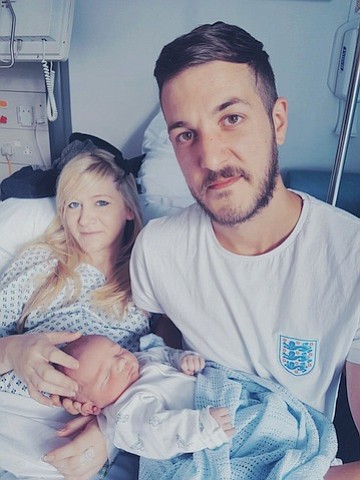Charlie Gard: British Baby at the Center of Global Debate
CNN/Stylemagazine.com Newswire | 7/5/2017, 11:50 a.m.

By Angela Dewan
CNN
LONDON (CNN) -- Eleven-month-old Charlie Gard has irreversible brain damage and cannot see, hear, move or even cry, doctors say. Yet this terminally ill British baby is at the middle of a global ethical argument over whether he should live or die, an argument that has attracted the attention of Pope Francis and US President Donald Trump.
Why is this case controversial?
Charlie has an extremely rare degenerative condition called mitochondrial DNA depletion syndrome. His doctors in Britain want to take him off life support, arguing that he has no hope of surviving without assistance and that he should be allowed to die in dignity. But Charlie's parents, Chris Gard and Connie Yates, want the hospital to release their baby into their custody so they can take him to the United States for an experimental treatment.
The case has resurfaced a decades-old debate over euthanasia and the use of life support, issues that have been fought in most corners of the world and that have often seen medical and religious arguments collide.
There is some legal uncertainty, too: Under British law, parental responsibility includes the right to give consent for medical treatment, according to the British Medical Association. However, parental rights are not absolute, and in cases in which doctors and parents disagree, the courts may exercise objective judgment in a child's best interest.
How was the decision made to end life support?
Gard and Yates lost their appeal to the European Court of Human Rights in France, which ruled June 27 that the hospital could discontinue Charlie's life support. They had already lost an appeal to the UK Supreme Court.
Now, the date Charlie's life support will be switched off appears to be up in the air, as the hospital is allowing the parents to spend more time with their child.
On Wednesday, British Prime Minister Theresa May expressed her sympathy for the baby's parents, saying she understood why they would want to explore all options for their child. But she also defended the hospital, saying that it would consider any offers on new information that would benefit the baby.
"I also know that no doctor wants to be placed in the terrible position where they have to make such heartbreaking decisions," she said.
Why has the Pope intervened?
The Pope spoke out on the issue Sunday after the head of his bioethics panel, Vincenzo Paglia, said that while the Catholic Church was against active euthanasia, it must accept that medicine had its limits and that "disproportionate" medical procedures should be avoided.
Paglia's comments reportedly upset some conservative Catholics, who argued that they advocated euthanasia and were patronizing to Charlie's parents.
The Vatican issued a statement Sunday that said the Pope felt the parents should be allowed to "accompany and treat their child until the end."
"He is praying for them, in the hope that their desire to accompany and care for their own child until the end will be respected," the statement said.
On Tuesday, a Vatican-owned pediatric hospital in Rome offered to take Charlie into its care. But British Foreign Secretary Boris Johnson told his Italian counterpart, Angelino Alfano, that Charlie would not be moved to the Vatican hospital.
Johnson told Alfano that "this was a deeply tragic and complex case for all involved and said it was right that decisions continued to be led by expert medical opinion, supported by the courts, in line with Charlie's best interests," a ministry spokeswoman said.
What's Donald Trump offering?
The case of Charlie Gard has also captured the attention of US President Trump, who on Monday offered US support for the baby.
"If we can help little #CharlieGard, as per our friends in the U.K. and the Pope, we would be delighted to do so," he wrote on Twitter.
Trump did not elaborate on how the US might help the child, but a US doctor has agreed to carry out an experimental treatment called nucleoside bypass therapy.
Yates said in a statement that she was taking support from Trump and the Pope seriously.
"The support from the Pope and the President has given us hope. They are traditional men who believe in the family. They believe in our case and understand why we believe it is right to continue fighting so hard to save Charlie," she said.
As the parents explained in their fundraising efforts, the therapy is an oral medication that provides Charlie with naturally occurring compounds that his body is not able to produce. His parents hope that the medicine might repair his flawed mitochondrial genes. Mitochondrial DNA depletion has a poor prognosis and leads to weakened muscles and organ dysfunction, among other symptoms.
According to bioethicist Julian Savulescu of the Oxford Uehiro Centre for Practical Ethics, the experimental therapy offers a very small chance of some improvement. It has never been used to treat this form of mitochondrial DNA depletion syndrome, though it has proved beneficial to patients with a different form of the disease.
CNN's Hilary Clarke, Susan Scutti, Livia Borghese, Eric Levenson, Schams Elwazer and Lorenzo D'Agostino contributed to this report.







